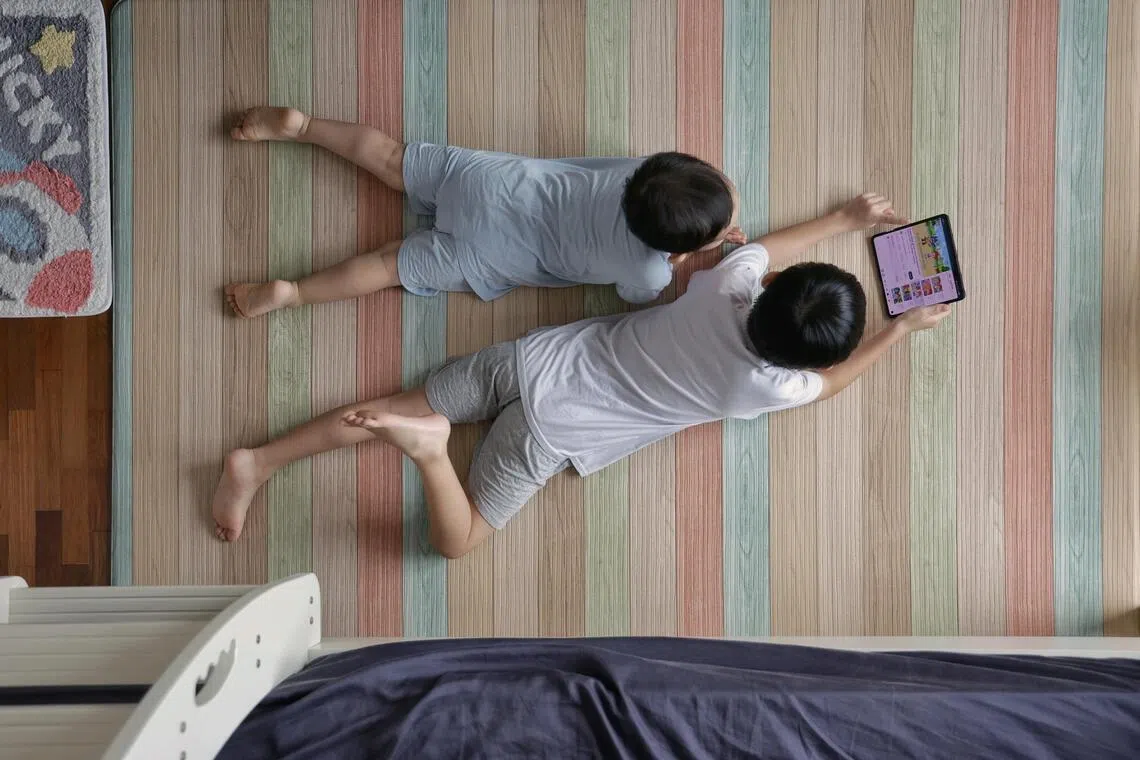S’pore parents call for help to manage children’s device use as lines blur between learning, leisure
Sign up now: Get tips on how to help your child succeed

Findings showed that more than half of children aged between two and six spend more than the one-hour daily limit on screen time recommended by the Ministry of Health.
PHOTO: ST FILE
- Parents struggle with children's excessive screen time due to school devices and academic needs, with many exceeding recommended limits.
- A survey reveals that many parents lack confidence in guiding their children's digital habits, which an observer called a "cry for help" for more accessible resources to meaningfully engage their kids.
- Parents suggest device limits, offline activities, and school-led education on the consequences of screen time to promote healthier technology use.
AI generated
SINGAPORE - Phones and laptops have become necessary in school settings today, used for schoolwork and communication with teachers and peers.
Many secondary school students also use their school-prescribed personal learning devices (PLDs) for non-academic purposes, parents said, adding that they find it difficult to stop their children from doing so when they get home from school.
“I am aware that it may not be possible to say no to a phone for my son in Secondary 1. This is because there are chat groups for academic work that may be set up. Parents like me may feel pressured because of messaging from the school,” said Mr Timothy Wong, a stay-at-home father to his 11-year-old son.
“I have lost count of how many times I have seen or heard of students using the PLD for non-school or non-academic purposes,” said the 50-year-old.
All PLDs are pre-installed with a device management application that blocks students’ access to undesirable internet content, such as pornography and gambling, and sets screen time limits.
The Straits Times spoke to eight parents about their challenges in managing their children’s screen use, following the release of an inaugural Ministry of Digital Development and Information (MDDI) survey on Sept 12 which involved nearly 2,000 parents in Singapore.
Findings showed that more than half of children aged between two and six
Around a quarter of those aged between seven and nine spend more than the recommended two-hour daily screen time limit on weekdays, with the figure doubling on weekends.
Parents said they struggle with keeping screens from their children when they are tired or busy.
“If I am too tired or need to do something urgently and cannot occupy them, the screens come in. When you turn the screens on, the kids become silent,” said Ms Quek See Leng, 41, a homemaker and mother of four children aged three, five, eight and 10.
“Let’s not be so quick to call it out as bad parenting when people give their kids a screen. After all, we see only a sliver of their lives,” she said.
Ms Julie Chiang, 47, concurred, saying she sets screen time limits for her three children aged 10, 13 and 14. “It is easy for an outsider to pinpoint and judge,” she said.
An escalation manager, who wanted to be known only as Mrs Nadiah, said: “Sometimes, parents just want some time to themselves.” The 30-year-old mother of three said her children also use devices for school work, apart from leisure activities.
Professor Lim Sun Sun said it is difficult to decouple learning from entertainment, adding that even activities that seem leisure-focused can be learning opportunities.
“For example, when designing a complex city or role-playing an adventure in Minecraft, kids can develop maths, problem-solving, storytelling and other creative skills,” said the Lee Kong Chian professor of communication and technology at Singapore Management University.
The MDDI survey showed that only 37 per cent of parents feel confident about their ability to guide their children’s digital habits.
Associate Professor Carol Soon of NUS’ communications and new media department said the number is a “cry for help”, and noted that community-based outreach is needed to ensure resources are made accessible to time-starved parents.
Some parents hope that schools can do more.
Mr Wong suggested that schools allow parents to opt out of school-prescribed PLDs, and return to paper and pen in the classroom, especially for lower secondary students.
A father of two boys aged six and nine, who wanted to be known only as Mr Tay, said he hopes schools can be more intentional with teaching about the mental consequences of excessive screen time.
“Teaching about the drawbacks of excessive screen time in a scientific or educational way will help. Parents can then reinforce this teaching at home,” said the 52-year-old, who works in the events industry.
Ms Siti Norhidayah, 42, a freelance Quranic teacher with four children aged six, 12, 16 and 18, suggested that schools could also provide bite-size tips on digital parenting.
Some parents take to offline activities with their children to wean them off their devices.
Mrs Nadiah, for one, lets her three children aged two, four and five draw on their walls, cycle and skate to expend their energy. When going out as a family, she takes along puzzles, colouring books and markers to keep them occupied.
Mr Daniel Ng, 63, said he and his wife often take their teenagers, aged 14 and 17, out for shopping trips and activities such as cycling to get them off their screens.
He said his 17-year-old son spends about four hours a day playing computer games, while his 14-year-old daughter is often on TikTok or texting her friends. The taxi driver said telling his children off often backfires and strains their relationship.
“We want them to interact more with others and spend less time using their devices,” he said.


